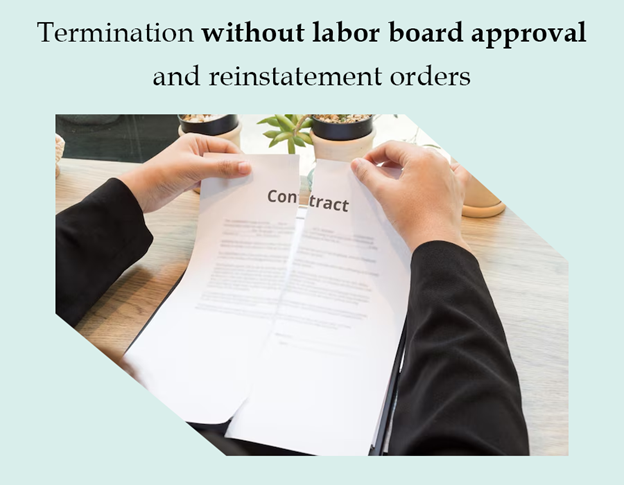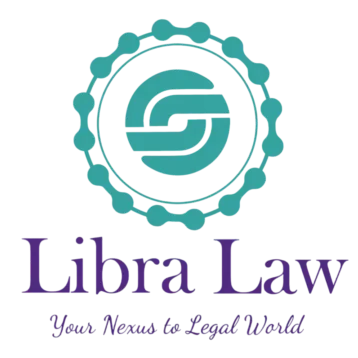Navigating Iran’s complex Employment and Labor Law landscape can be a serious challenge — especially for business owners striving to remain compliant while protecting their interests. Employment and Labor Law in Iran; Avoid Legal Mistakes Before You Face Them is an essential guide to help you understand the intricacies of local labor regulations. In the broader context of international trade, where cross-border operations and workforce management are deeply intertwined, understanding local labor regulations becomes even more critical. From hiring and compensation to termination and dispute resolution, every decision you make can have serious legal implications; That’s why our legal specialists at LibraLaw Firm have prepared this comprehensive guide — to help you understand your rights and obligations under Iranian labor law and to show you how proactive legal counsel can prevent costly disputes before they arise.
Whether you’re managing a local enterprise or a multinational company with operations in Iran, this is essential reading. Our experienced attorneys break down what employers need to know — not only to stay compliant, but to build a legally sound, efficient and resilient workforce.
Are You Fully Aware of Your Rights Under Iranian Labor Law?
Issues such as wrongful termination, workplace discrimination, wage and hour disputes and unpaid overtime are among the most common challenges employees face; These problems can have a significant impact on a person’s livelihood and well-being. A major underlying cause of many labor disputes is the lack of awareness about existing labor laws and employee rights under national regulations. Without proper guidance, individuals often miss critical deadlines for filing complaints or fail to provide the necessary documentation; mistakes that can lead to dismissed claims and the permanent loss of legal protections.
In the context of Iranian labor law, these issues involve additional considerations that employees must understand to safeguard their rights; For example, the Iranian Labor Code requires employment contracts to be in writing and to specify duties, wages and working hours. If an employer terminates an employee without legitimate cause, the law provides for either reinstatement or severance compensation, as determined by the Dispute Resolution Committees under the Ministry of Cooperatives, Labor and Social Welfare.

For a deeper understanding of what should be included in your job agreement, see our article: «Your Rights in Employment Contracts; What Should Be Included in Your Job Agreement?»
Are You Prepared to Protect Your Rights Under Iranian Employment Law?
Issues such as wrongful termination, workplace discrimination, wage and hour disputes and unpaid overtime are among the most common problems employees encounter; These issues can significantly affect an individual’s livelihood and overall well-being. A frequent cause of many labor disputes is a lack of awareness about existing legal frameworks and the protections available to employees under national regulations. Without proper guidance, individuals often miss critical deadlines for filing complaints or fail to submit the necessary documentation — errors that can result in rejected claims and the permanent loss of legal rights.
In Iran, the Labor Code sets out comprehensive regulations governing employment relationships, including probationary periods, termination conditions, severance pay\ and working hours. However, effective enforcement often depends on how well employees can document their claims and comply with procedural requirements. One essential but often overlooked right is the employer’s obligation to register workers with Social Security and to provide payslips — violations of which can serve as evidence in disputes over unpaid wages or unlawful termination.
Moreover, Iran’s labor law provides employees with access to quasi-judicial mechanisms such as the Dispute Resolution Boards; These specialized bodies are authorized to assess employment claims in a relatively expedited manner. However, success before these boards often depends on effective legal representation and thorough preparation. Employees who are unaware of procedural deadlines or documentation standards may find themselves at a disadvantage — even when their claims are valid.

At Libralaw, our legal experts are not only fully up-to-date with the latest developments, amendments and interpretations of labor-related statutes — particularly Iran’s Labor Code — but also deeply familiar with the procedural aspects of presenting claims before relevant bodies, including the Dispute Resolution Boards and the Administrative Court of Justice; For instance, our attorneys routinely assist clients in preparing comprehensive petitions supported by evidence such as employment contracts, payslips or witness statements to reinforce their claims. We also offer strategic guidance on how to respond to employer counterclaims, ensuring that clients maintain a strong legal position throughout the process.
To further support claimants, Libralaw provides legal consultations on preventive measures — such as reviewing employment contracts prior to signing, advising on workplace harassment issues, or clarifying overtime entitlements — to help avoid disputes before they occur. We believe that legal literacy and timely consultation are essential to empowering workers and promoting fair labor practices.
How Can Multinational Companies Navigate Employment Compliance in Iran?
Furthermore, any multinational company seeking to establish a business in Iran must fully understand the employment regulations governing the local labor market; These regulations are not only crucial for ensuring compliance but also for minimizing legal risks in daily operations. A key concern for foreign investors is understanding how many local versus foreign employees they are permitted to hire under Iranian labor law; For example, under current immigration and labor regulations, employing foreign nationals generally requires a valid work permit and companies are obligated to prioritize hiring Iranian citizens unless specific expertise is unavailable domestically.
Additionally, Iranian labor law imposes strict obligations on employers, regardless of their nationality or the company’s country of origin. All employees — whether foreign or domestic — must be registered with the Social Security Organization and companies are required to make monthly contributions based on employees’ salaries. Failure to comply with these requirements can result in fines or even the suspension of business licenses.
Multinational firms should also be aware that Iranian labor law does not generally recognize the concept of «at-will employment», which is present in some legal systems. Employment relationships in Iran are typically long-term by default, unless otherwise specified in a fixed-term contract. Terminations require specific legal justifications and approval from the relevant labor authorities. Therefore, HR practices must be carefully aligned with local norms to avoid wrongful termination claims or labor board disputes.

Work permits for foreign staff are issued by the Ministry of Cooperatives, Labor, and Social Welfare and generally require the employer to demonstrate that the necessary expertise is not available within Iran; The process also involves cooperation with the Ministry of Foreign Affairs and the Iranian Immigration and Passport Police, particularly when the employee’s role is sensitive or strategic.
For a deeper understanding of the legal options available for entering the Iranian market, see our article: «A Simple Guide to Entering the Iranian Market; Choosing the Right Legal Structure for Foreign Investment».
At Libralaw, we assist multinational clients throughout this process — from reviewing employment contracts to securing work permits and ensuring compliance with labor and tax regulations. Our legal experts regularly advise international businesses on structuring their HR policies in Iran to comply with both local legislation and international standards, helping them avoid liability and establish legally sound operations from the ground up.
How Can Foreign Companies Draft Compliant and Protective Employment Contracts in Iran?
Another key issue is how to draft employment contracts that comply with Iran’s Labor Code while also safeguarding the company’s interests; This includes aspects such as defining probationary periods, termination clauses, benefits and dispute resolution mechanisms. Failing to structure such contracts correctly can expose the company to costly legal disputes or wrongful termination claims.
Under Iranian labor law, employment contracts may be either written or verbal. According to Article 7 of the Labor Code, an employment contract is defined as an agreement — either in writing or orally — under which the employee agrees to perform work for the employer in exchange for remuneration. However, written contracts are highly recommended, particularly for foreign companies and long-term employment arrangements, as they provide greater legal certainty and are easier to enforce in the event of a dispute.
Article 10 of the Labor Code recommends that written contracts include key elements such as job descriptions, salary details, working hours, place of work, leave entitlements and termination conditions. While not mandatory in all cases, written agreements help eliminate ambiguity and strengthen legal protection for both parties.

It is also important to note that Iranian labor law does not permit at-will termination. All dismissals must be justified and in most cases, reviewed or approved by labor authorities. Even probationary periods must be clearly defined and premature termination can still lead to legal challenges if not handled carefully.
For an overview of fundamental elements every employment contract should include, see our article: «Employment Contracts in Iran; A Legal Guide for Employers and HR Managers».
At Libralaw, our team provides comprehensive legal support for foreign companies looking to establish compliant employment practices in Iran. We assist in drafting custom contracts that reflect your operational needs while aligning with domestic labor standards. From advising on statutory employee rights to managing terminations and dispute resolution, we ensure that your business maintains both compliance and flexibility. Our experts are highly knowledgeable in the complexities of Iranian labor law and offer strategic guidance to minimize legal risks.
Are You Ensuring Full Compliance with Labor and Employment Laws in Iran?
Our Labor and Employment attorneys possess hands-on experience in all major aspects of employment law, providing clients with comprehensive support throughout every stage of the employment relationship; This includes, but is not limited to:
- Pensions and Employee Benefits: Advising companies on legally compliant pension schemes and fringe benefits, ensuring all offerings meet both regulatory requirements and employee expectations.
- Executive and Employee Compensation: Structuring compensation packages that align with Iranian labor standards while remaining competitive and incentive-driven.
- Hiring and Termination Issues: Guiding employers through lawful recruitment practices and advising on termination procedures that avoid claims of wrongful dismissal or violation of notice requirements.
- Retirement Standards and Workers’ Compensation: Assisting businesses in implementing retirement policies in line with national social security regulations and supporting compensation claims for work-related injuries or illnesses.

- Safety and Health Standards: Ensuring workplaces comply with occupational health and safety laws, including preventive strategies and audit readiness.
- Unfair Dismissal: Representing both employers and employees in cases involving claims of illegal termination and providing legal strategies to defend or assert such claims.
- Drafting Employment Contracts: Preparing clear, enforceable and customized employment contracts that address probationary periods, salary structures, non-compete clauses and other essential terms.
With each of these services, our team works closely with clients to not only address immediate legal challenges but also to develop long-term strategies for compliance, conflict prevention and workforce stability.
Is Your Business Ready for Compliance with Iranian Labor Laws?
At Libralaw, our team of skilled labor and employment attorneys offers tailored legal services to businesses operating in Iran, ensuring that every aspect of your employment practices is compliant with local labor laws. We understand the complexities of the Iranian regulatory environment and provide businesses with clear, strategic guidance to mitigate legal risks and promote a stable, productive workforce.
Our Key Services Include:
- Recruitment and Onboarding: We assist businesses in structuring recruitment processes that comply with Iranian labor laws; This includes drafting clear, legally sound job contracts, ensuring proper documentation and guiding employers through the legal requirements for employee registration with the Social Security Organization.
- Employee Benefits and Rights: Our attorneys help businesses design and implement employee benefit packages that comply with local regulations, including pensions, health insurance, leave entitlements and other fringe benefits. We ensure that your offerings are both competitive and legally compliant.
- Termination Procedures and Dispute Resolution: We provide expert guidance on lawful termination procedures, helping businesses avoid wrongful dismissal claims and ensuring compliance with notice periods and other legal requirements. In case of disputes, we offer representation and legal strategies for resolving issues before labor authorities or in court.

- Compliance and Risk Management: We help businesses navigate the complexities of compliance with Iranian labor laws, including occupational health and safety standards, workplace regulations and social security obligations. By ensuring ongoing compliance, we help minimize legal risks and avoid costly penalties.
- Long-term HR Strategies: Beyond immediate legal issues, we partner with businesses to develop long-term human resources strategies that foster employee retention, boost productivity and enhance overall workforce stability. Our strategic advice helps you build a compliant and efficient workforce while aligning with both local and international best practices.
At Libralaw, we work closely with our clients to ensure that every stage of the employment relationship is legally sound, efficient and aligned with the evolving landscape of Iranian labor laws. With our expertise, businesses can confidently manage their workforce while minimizing legal risks and promoting a positive working environment.
Given the complexity and high stakes involved in navigating Employment and Labor Law in Iran — especially within the broader framework of international business — consulting with specialized legal professionals is not just helpful, but essential. If you require guidance or legal assistance in this area, the labor and employment attorneys at LibraLaw are equipped with the expertise and experience to support you every step of the way.
Contact us today to ensure your business is compliant, protected and positioned for long-term success.









